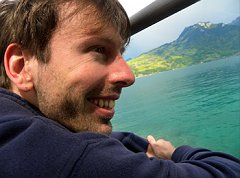Artifacts developed alongside research presented in papers serve several important roles. They enable reproducing research results by independent researchers; they enable practically evaluating ideas and theories; they enable experimentation with variations and extensions (not only by the original authors); and so forth.
However, developing high-quality artifacts requires a lot of effort that is not always justified. Importantly, as it stands, artifacts have no influence on acceptance of a research paper at the top conferences in programming languages and software engineering. Moreover, the main requirement for completing a PhD is producing publishable research results. As a result, one of the most difficult questions for many doctoral students is: “how much time should be spent on developing artifacts?”
In this talk I share my experience contributing to the Scala programming language, tools, and libraries during my own graduate studies. Among the artifacts that I discuss: a library that was picked up by Twitter and secured a book deal; and a compiler plugin that (to my knowledge) only one other person in the world tried to use–and gave up. “How can artifacts support research and publication? How can artifacts support the discovery of important research problems? How can artifacts contribute to a successful career?” My talk attempts to shed light on these and related questions.
My areas of research are programming languages, type systems, and concurrent/distributed programming.
Previously, I was a researcher, software engineer, and consultant at Typesafe. Prior to Typesafe, I was a post-doctoral fellow in the Pervasive Parallelism Lab at Stanford University and in the Programming Methods Lab (LAMP) at EPFL, Switzerland. Prior to that I was a PhD student of Martin Odersky. My main research interests are in the design and implementation of programming languages and managed runtime environments to support concurrent and parallel software. I received a PhD in Computer Science from EPFL in Lausanne, Switzerland, in 2010.
I am a top-10 contributor of the Scala project. Recently, I have been working on Scala 2.10 futures (SIP-14) as well as Scala’s upcoming Async feature (SIP-22) for asynchronous and concurrent programming.
Sun 17 JulDisplayed time zone: Amsterdam, Berlin, Bern, Rome, Stockholm, Vienna change
16:00 - 17:30 | |||
16:00 30mTalk | Sulong: Memory Safe and Efficient Execution of LLVM-Based Languages Doctoral Symposium | ||
16:30 30mTalk | Invited Talk: Papers vs. Artefacts Doctoral Symposium Philipp Haller KTH Royal Institute of Technology | ||
17:00 30mTalk | Invited Talk: PhD Reflections Doctoral Symposium Sebastian Erdweg TU Delft | ||
